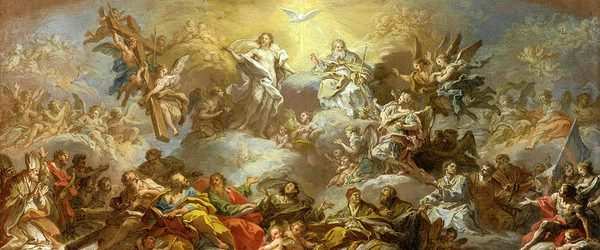WHAT DOES IT TAKE TO BECOME A SAINT?
WHAT DOES
IT TAKE TO BECOME A SAINT?
There is only one absolutely
perfect Saint in the history of the Church, and that, of course, is the Blessed
Virgin Mary. The Second Vatican Council
stated that the Church already has achieved her perfection in Mary “without
spot or wrinkle,” but that all the other members of the Church must strive to
achieve what she has achieved. In fact,
the Catechism of the Catholic Church teaches that “All members of the Church,
including her ministers, must acknowledge that they are sinners. In everyone, the weeds of sin will still be
mixed with the good wheat of the Gospel until the end of time” (827). Thus Jesus says, “Let them grow together
until harvest; then at harvest time I will say to the harvesters, ‘First
collect the weeds and then tie them in bundles for burning but gather the wheat
in my barn’ (Mathew 13:30).”
One of the four marks of the Church
is that she is holy. She is holy
inasmuch as Christ is her head and he has given her the Holy Spirit, who remains
with her. “United with Christ the Church
is sanctified by him; through him and with him she becomes sanctifying” (Cat
824). Her holiness is the result of the operation
of grace, which the Church, directed by God, dispenses through the celebration
of the Sacraments and the preaching of the Word. The members of the Church contribute to her
holiness by their holy way of life; they can also diminish it by their sinful
acts. This is why a priest or bishop is
necessary for the Sacrament of Reconciliation, for sins are acts against both
God and the Church. In the absolution of
the minister one of the effects is to welcome back into communion with the People
of God the sinner who has committed a mortal sin.
The Second Vatican Council states
that all the baptized are called to sanctity of life. We first receive this call when we are baptized. But, of course, it is not gained without a struggle. It requires willingness; a true Saint is
willing to engage in this battle against oneself and against the enemy of the
soul. After putting the time in to fight
the good fight he or she will be noticed by others to have achieved unusual virtue,
and this is how their reputation spreads, without any desire on their own. Those who take notice usually are friends,
fellow religious, priests, superiors, or family members. During their lifetimes, or soon after, they excitedly
recount the many extraordinary things they noticed about the Saint’s character
and habits. One of the most important
characteristics which should not be overlooked, of course, was not just their
love for God, but also their tender love for the poor. For without love for the poor no one may
obtain holiness.
Saints cultivated an awareness of
the presence of God in their lives. They
also kept their eyes lifted to heaven. Being
aware of the nearness of God helped them to endure all the hardships on their
path. A true Saint knows that holiness requires
self-sacrifice and discipline. One must
be willing to pay this price if one wants to win the prize. By doing so, they fulfill the purpose for
which they were created. Everyone is
created to know God, to love God, and to serve God. It is God’s will that all come to the knowledge
of the truth, to have true faith, and to gain salvation. Those who do are the most blessed of all
people. They live their lives wisely,
and they are not easily distracted or bored.
Every day is new with the Lord. There
are many rewards in this life for those who walk the way of the Saints, but no reward
on this side of heaven is lasting. The
real reward is eternal life.
St. Bernard admonished his brothers
to earnestly desire the rewards of heaven.
He said, “Let us long for those who are longing for us, hasten to those
who are waiting for us, and ask those who look for our coming to intercede for
us. We should not only want to be with
the saints, we should also hope to possess their happiness. While we desire to be in their company, we
must also earnestly seek to share in their glory. Do not imagine that there is anything harmful
in such an ambition as this; there is no danger in setting our hearts on such
glory.”




Comments
Post a Comment